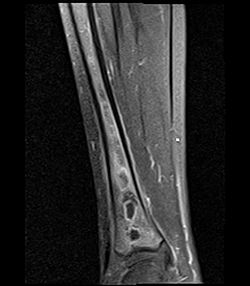Brodie abscess

Editor-In-Chief: Prab R Tumpati, MD
Obesity, Sleep & Internal medicine
Founder, WikiMD Wellnesspedia &
W8MD's medical weight loss NYC, sleep center NYC
Philadelphia medical weight loss and Philadelphia sleep clinics
| Brodie abscess | |
|---|---|

| |
| Synonyms | Subacute osteomyelitis |
| Pronounce | N/A |
| Specialty | N/A |
| Symptoms | Localized bone pain, swelling, tenderness |
| Complications | Chronic osteomyelitis, bone destruction |
| Onset | Gradual |
| Duration | Persistent if untreated |
| Types | N/A |
| Causes | Staphylococcus aureus infection |
| Risks | Trauma, previous infection, immunocompromised state |
| Diagnosis | MRI, X-ray, Bone scan |
| Differential diagnosis | Bone tumor, Osteoid osteoma, Ewing's sarcoma |
| Prevention | N/A |
| Treatment | Antibiotics, Surgical drainage |
| Medication | Antibiotics such as clindamycin, vancomycin |
| Prognosis | Good with treatment |
| Frequency | Rare |
| Deaths | N/A |
Incidence[edit]
It that accounts for 2.5%–42% of primary bone infections.
Patient characteristics[edit]
The patients are younger than 25 years of age. They usually present with joint pain and localized swelling.
Signs and symptoms[edit]
Signs and symptoms of systemic disease are frequently absent and usually only have joint pain and swelling.

Cause[edit]
- Staphylococcus aureus (30%–60%)
- Pseudomonas (5%)
- Klebsiella (5%) and
- Coagulase-negative Staphylococcus (5%) are causative organisms.
Culture negative[edit]
20% of cultures are negative for these organisms.

Radiology[edit]
- Radiographically, an intramedullary area of central lucency with sclerotic margins is characteristic.
Differential diagnosis[edit]
- Differential diagnosis of Brodie abscess includes many forms of benign and malignant bone lesions including but not limited to bone cysts, osteoid osteoma, giant cell tumor, chondroblastoma and Ewing sarcoma.
Diagnosis[edit]
X-rays, CT scan, MRI, blood cultures etc.
Treatment[edit]
- A course of systemic antibiotics, surgical débridement.
- Sometimes bone grafting maybe required a large cavity requires stabilization.
| Bone and joint disease | ||||||||||||||||||||
|---|---|---|---|---|---|---|---|---|---|---|---|---|---|---|---|---|---|---|---|---|
|
Ad. Transform your life with W8MD's Budget GLP-1 injections from $75


W8MD offers a medical weight loss program to lose weight in Philadelphia. Our physician-supervised medical weight loss provides:
- Weight loss injections in NYC (generic and brand names):
- Zepbound / Mounjaro, Wegovy / Ozempic, Saxenda
- Most insurances accepted or discounted self-pay rates. We will obtain insurance prior authorizations if needed.
- Generic GLP1 weight loss injections from $75 for the starting dose.
- Also offer prescription weight loss medications including Phentermine, Qsymia, Diethylpropion, Contrave etc.
NYC weight loss doctor appointmentsNYC weight loss doctor appointments
Start your NYC weight loss journey today at our NYC medical weight loss and Philadelphia medical weight loss clinics.
- Call 718-946-5500 to lose weight in NYC or for medical weight loss in Philadelphia 215-676-2334.
- Tags:NYC medical weight loss, Philadelphia lose weight Zepbound NYC, Budget GLP1 weight loss injections, Wegovy Philadelphia, Wegovy NYC, Philadelphia medical weight loss, Brookly weight loss and Wegovy NYC
|
WikiMD's Wellness Encyclopedia |
| Let Food Be Thy Medicine Medicine Thy Food - Hippocrates |
Medical Disclaimer: WikiMD is not a substitute for professional medical advice. The information on WikiMD is provided as an information resource only, may be incorrect, outdated or misleading, and is not to be used or relied on for any diagnostic or treatment purposes. Please consult your health care provider before making any healthcare decisions or for guidance about a specific medical condition. WikiMD expressly disclaims responsibility, and shall have no liability, for any damages, loss, injury, or liability whatsoever suffered as a result of your reliance on the information contained in this site. By visiting this site you agree to the foregoing terms and conditions, which may from time to time be changed or supplemented by WikiMD. If you do not agree to the foregoing terms and conditions, you should not enter or use this site. See full disclaimer.
Credits:Most images are courtesy of Wikimedia commons, and templates, categories Wikipedia, licensed under CC BY SA or similar.
Translate this page: - East Asian
中文,
日本,
한국어,
South Asian
हिन्दी,
தமிழ்,
తెలుగు,
Urdu,
ಕನ್ನಡ,
Southeast Asian
Indonesian,
Vietnamese,
Thai,
မြန်မာဘာသာ,
বাংলা
European
español,
Deutsch,
français,
Greek,
português do Brasil,
polski,
română,
русский,
Nederlands,
norsk,
svenska,
suomi,
Italian
Middle Eastern & African
عربى,
Turkish,
Persian,
Hebrew,
Afrikaans,
isiZulu,
Kiswahili,
Other
Bulgarian,
Hungarian,
Czech,
Swedish,
മലയാളം,
मराठी,
ਪੰਜਾਬੀ,
ગુજરાતી,
Portuguese,
Ukrainian